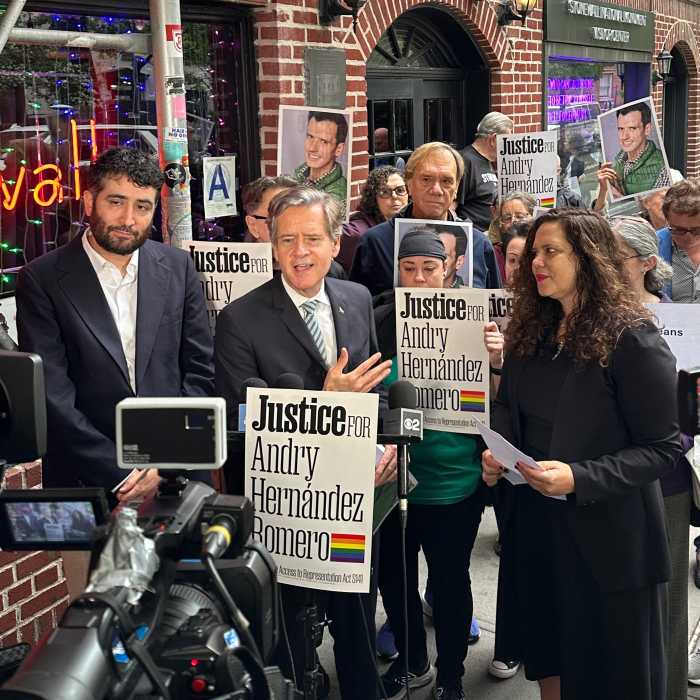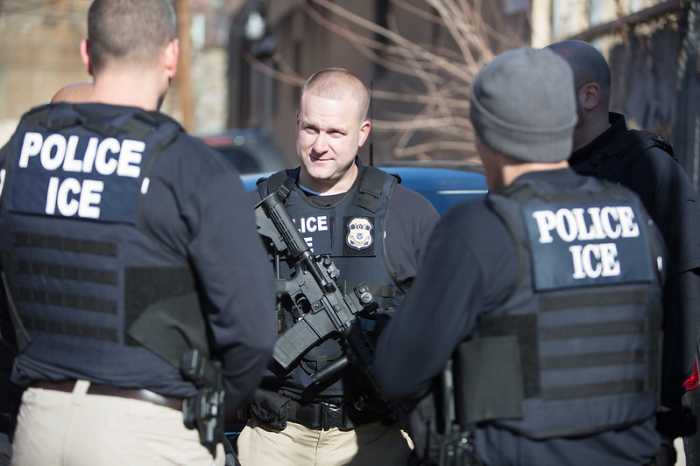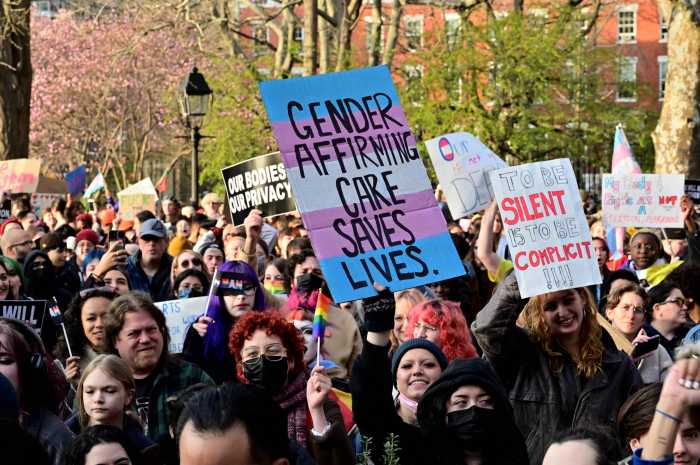In an historic first for Russia, on Saturday, November 20, activists in St. Petersburg held the first-ever legal gay rights demonstration approved by authorities anywhere in that nation.
The rally took place just one month after the European Court of Human Rights (ECHR) issued a landmark ruling in the Alexeyev v. Russia case, declaring that Moscow’s repeated bans on gay pride marches and events were illegal.
A jubilant Maria Efremenkova, a principal organizer of Saturday’s successful demonstration, told Gay City News by telephone from St. Petersburg, Russia’s second largest city, that “there were 15 gay activists who were participants,” while a number of supporters looked on.
But the gay contingent was hugely outnumbered by a highly organized homophobic counterdemonstration that included more than 100 religious extremists and skinheads. Some local radio stations played Christian Orthodox religious music during the demonstration, the Russian news agency Interfax reported.
“These fanatics screamed homophobic insults at us and chanted religious songs and slogans, threw eggs at us, and finally tore down our posters, banners, and rainbow flags, at which point we ended the demonstration after about 40 minutes,” Efremenkova said.
She noted her disappointment that police did a wholly inadequate job of protecting the gay activists from the violent counter-demonstrators. The 40-some police present were outnumbered by more than two to one by the homophobic demonstrators.
“The police explained to us they weren’t expecting so many of them,” Efremenkova said. “But that is no excuse for not following Russian law and protecting our right to free speech.”
In another first, the gay activists’ rally received coverage on local St. Petersburg TV stations, which are government controlled.
“Although most media coverage focused on the egg-throwing by the homophobes,” Efremenkova told Gay City News, “the impact of breaking the silence on homosexuality cannot be overestimated. Seeing strong, proud gay people speaking out and standing up for themselves and declaring they want the same human rights as everyone else inspires many people — especially those gays in the closet and young people struggling with creating their own identity in a homophobic society — to know they are not alone.”
The demonstration was also extensively covered on Echo Moscovy, a popular independent radio station heard throughout the country.
“Most Russian gays are in the closet, so visibility and coming out are our path to a brighter future of freedom and our day in the sun,” Efremenkova emphasized.
The gay rights rally was organized by Equality St. Petersburg, a fledgling direct action group of lesbians and gays founded in February with the help of Nikolai Alexeyev, the courageous young Moscow lawyer who has been the lead organizer of the banned Moscow Gay Prides and the founder of gayrussia.ru, the gay human rights news website that has been the principal catalyst for modern Russian gay organizing. Alexeyev was in St. Petersburg at that time in connection with a gay rights demonstration at which 12 activists were arrested. (For a profile of Nikolai Alexeyev and his work, see this reporter’s June 24, 2010 article, “Moscow’s Man of Action.”)
“Nikolai was terribly important in helping organizing our group,” Efremenkova told this reporter. “His example and his experiences in gay organizing were inspiring and invaluable lessons for us.”
Alexeyev told Gay City News that at that February meeting, “I related our five years of experience and struggle around Moscow Pride and told them we’d support whatever they do. But I told them, ‘You have to choose your own way to fight for your rights,’ and I reassured them that they had the right to decide for themselves what they wanted to do.”
The soft-spoken Efremenkova traces her own decision to become a gay activist to seeing the film “Milk,” which starred Sean Penn as the gay activist who was elected to the Board of Supervisors in San Francisco and assassinated by a homophobic ex-colleague from that body. The film was commercially released in Russia.
“It was after seeing ‘Milk’ that I decided I had to do something,” Efremenkova told me, saying she next began contacting people who could form the nucleus of a new, militant activist organization. “Some I’d met in discussions after an LGBT film festival, others I knew from a Day Against HIV we’d held in December 2009, and some I met through social networking on the Internet,” she said.
After pulling that group together, Efremenkova explained, “it was after our meeting with Nikolai Alexeyev that I was inspired to organize the first St. Petersburg Gay Pride, which we chose to have on June 26 this year to commemorate the Stonewall Rebellion, of course.” That event, however, was banned by the city authorities.
“Now,” she said, “we have a core group of about ten people who participate in every one of our actions, and another dozen supporters who come from time to time.”
After the visibility of Saturday’s successful demonstration, Efremenkova said, Equality St. Petersburg’s plans include launching its own website, now in preparation, and “recruiting new people to join us. We want to recruit you, as Harvey Milk used to say,” she noted with a chuckle.
There are no public actions planned in St. Petersburg for the winter months —“You know that our winters are very cold!,” Efremenkova said. The next big focus for Equality St. Petersburg will be the third annual Slavic Gay Pride march to be held there next June 26.
Slavic Gay Pride was founded in November 2008 by Alexeyev and his colleagues in the Moscow Pride committee in collaboration with activists from Gay Belarus, the LGBT group in that former Soviet republic, the Belarusian Initiative for Sexual and Gender Equality, and the LGBT Rights Committee of the Belarusian Green Party.
The first Slavic Pride was held in Moscow — and broken up by police — at the time a delegation of Belarusian gay activists traveled to the Russian capital during the Eurovision song contest, a popular annual event televised all over Europe.
This year’s Slavic Pride took place in the Belarusian capital of Minsk, but was violently crushed by police in that authoritarian country, with a dozen activists arrested.
“We will come out for Slavic Pride even if we don’t get permission to hold it!” Efremenkova declared of the scheduled St. Petersburg version next summer.
She said that the ECHR ruling that bans on Moscow Pride were illegal was “definitely a big influence” on the decision by St. Petersburg authorities to grant permission for Saturday’s demonstration.
Just as important, Alexeyev pointed out, were two October federal district court decisions in St. Petersburg invalidating that city’s prohibition on gay pride demonstrations.
“The city has very smart lawyers, and adding those district court decisions to the ECHR ruling, they saw they could be in a world of trouble if they didn’t grant permission for Saturday’s demonstration,” Alexeyev said. “The city did not even appeal those court judgments against them.”
St. Petersburg is one of Russia’s great tourist destinations, with such well-known attractions as its network of canals, the immense art collection in the Hermitage, and the sumptuous Winter Palace of the former czars, the seizure of which capped the October 1917 Revolution that brought the Bolsheviks to power. It has historically been considered the most European city in Russia ever since it became the country’s “window to the West” during the reign of Peter the Great. Even during Soviet rule, St. Petersburg prided itself on its reputation as culturally cosmopolitan and more liberal than other Russian cities.
The sort of unfavorable global publicity provoked by the repeated bans on gay pride celebrations in Moscow by its ultra-homophobic former mayor, Yuri Luzhkov, is clearly at odds with St. Petersburg’s efforts to continue luring Western tourists. That factor undoubtedly played into the city’s calculation in granting Equality St. Petersburg permission to demonstrate.
At the end of September, after 18 years as Moscow’s mayor, during which the notoriously corrupt Luzhkov and his wife became billionaires, he was fired by Russian President Dmitri Medvedev as he became mired in yet another ethical scandal. The new mayor, Sergei Sobyanin, a loyalist of Russia’s strongman prime minister, Vladimir Putin, was appointed by Medvedev and approved by the Moscow City Council last month.
Gay City News asked Alexeyev if, given his win at the ECHR, there had yet been any indication of the new mayor’s attitude toward gays or Moscow Pride. “Sobyanin has never publicly expressed his views on homosexuality, and so far there has been absolutely no reaction on the part of city authorities to the ECHR decision,” he responded.
But on November 16, the news website Gazeta.ru published a letter penned by Moscow’s prosecutor general, Yury Semin, demanding that police crack down on opposition groups planning unsanctioned rallies, with authorities bringing charges as soon as organizers announce their plans. Human rights advocates say that Semin’s proposal is not based on Russian law, and could be considered applicable to the kind of unauthorized gay public actions Alexeyev has organized for the last five years.
And on November 22, the daily Kommersant quoted Russia’s top magistrate, Constitutional Court Chief Justice Valery Zorkin, telling a law forum in St. Petersburg this past weekend, “Russia, if it wishes, may withdraw from the jurisdiction of the European Court of Human Rights.”
Zorkin added that the right of recourse to the European Court could be seen as “encouraging those in Russia who want any excuse” to sidestep their own courts at home. To cut off Russians from the European Court, the Russian government would have to pull out of the 47-member Council of Europe, which it joined in 1996 — a move which would severely damage its relations with Western Europe.
Alexeyev responded to Zorkin’s comments by saying, in an e-mail, “This is not the first attack of the head of the Constitutional Court of Russia against the European Court. His ‘arguments’ are senseless.
“It’s worth noting that the Constitutional Court managed to make a decision supporting the law which bans propaganda of homosexuality to minors in one region of Russia. While this regional law clearly contradicts the Constitution, his Court confirmed it does not. While it obviously contradicts the European Convention, his Court said it does not. I can’t even imagine the blast at him when the European Court gives its decision in this case. And this case is also pending with the UN Human Rights Committee.”
Reuters reported it had been told by a member of Medvedev’s administration that Zorkin’s proposal would most likely not be approved by the Kremlin. “I do not think we are developing backwards just yet,” he told Reuters on condition of anonymity.
But the success of Equality St. Petersburg in winning the right to demonstrate is a clear vindication of the young Moscow lawyer’s two-pronged strategy — a series of militant direct actions, including civil disobedience, in defiance of the more than 200 bans on gay events in Russia in the last five years, which have raised the visibility of Russian gays and their human rights struggle, followed by a long and patient fight in the courts using Russia’s own laws, constitution, and the international treaties which it has signed to hold authorities accountable and to expand freedom of speech and assembly.
In the course of his intrepid fight, Alexeyev has been arrested countless times, and, in the most bizarre government harassment aimed at him, in September, he was subjected to a frightening 72-hour ordeal in which he was kidnapped, drugged, and intimidated by Putin’s security forces in an attempt to get him to withdraw the ECHR lawsuit he only weeks later won. (See this reporter’s September 29 article, “Global Outcry Frees Russian Gay Leader.”)
Just back from St. Petersburg, Alexeyev spoke to Gay City News via cell phone early on November 22 as he was heading to yet another court hearing — the first in his legal challenge to Moscow’s ban on a demonstration he and his colleagues planned outside of the Moscow office of the Council of Europe early this month in support of their victory at the ECHR.
“This ban was particularly outrageous and discriminatory because the Moscow authorities had authorized a large homophobic demonstration in the very same place protesting the ECHR’s ruling,” Alexeyev said.
Every one of these pro-gay efforts in Russia is crucial, from the perspective of activists there.
“People in many countries made this first legal gay rights demonstration here possible,” Equality St. Petersburg’s Efremenkova told this reporter. “Gay Pride means the whole history which has gone before in all the countries in which homosexuality was once a crime. It’s easier for us to speak out because of what the world’s LGBT community preceded us in doing. But it’s such a long struggle…”
The full text of the European Court of Human Rights historic decision in Alexeyev v. Russia, in English, is online at tinyurl.com/3az2sdf. Doug Ireland can be reached through his blog, DIRELAND, at http://direland.typepad.com/.































